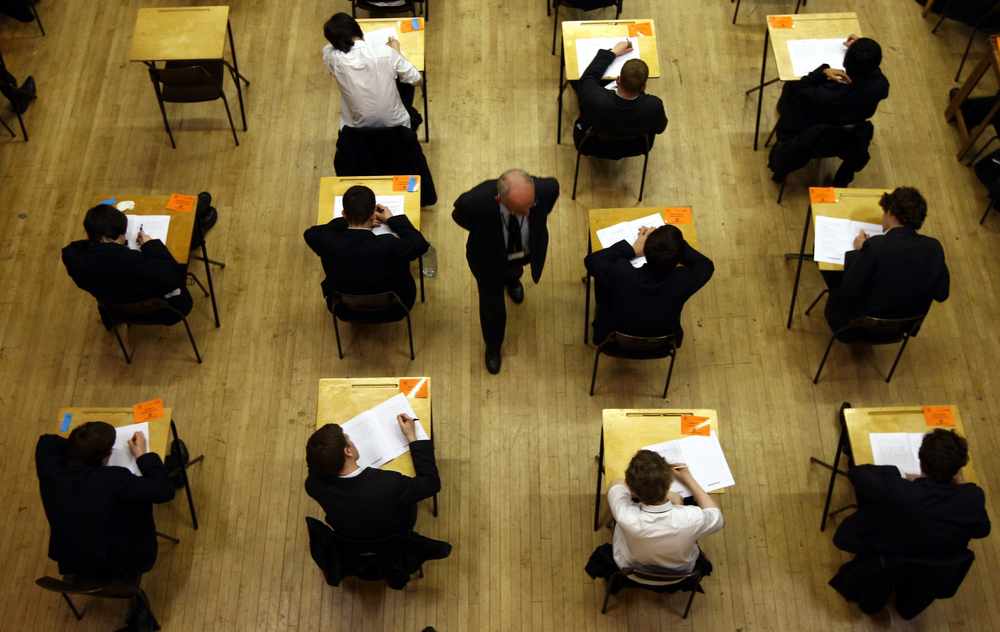During Tuesday’s States sitting Education Minister Rod Bryans said that discussions were currently taking place between the Treasury, Education and the Community Savings Bank to investigate setting up a loan scheme – and that it could potentially be in place by 2016.

- Jersey students who started their courses after 2012 pay between £6,157 and £24,065 in tuition fees per year
- A recent study showed that for essentials like accommodation, food, study materials and travel, first-year students at UK universities pay an average of between £167 and £287 per week
- Over the course of an average 40-week year, essential costs vary between an average of between £6,680 and £11,480
- For tuition and essential costs, first-year students beginning in 2014 are therefore likely to be paying between £12,837 and £35,545 per year[/breakout]
The move has been welcomed by Malcolm Ferey, head of the Jersey Citizens Advice Bureau, who said that such a scheme would make going to university more accessible for ‘everybody’.
It is estimated that first-year students who started UK university courses in 2014 are likely to be paying between £12,837 and £35,545 per year in tuition and other expenses.
Mr Ferey said: ‘Quite often we have parents coming in asking how they are going to afford to send their children to university.
‘If a loan scheme does come into being it’s going to make further education more accessible for everybody, and that has to be a positive step,’ he said.
However, concerns have also been expressed that the move could saddle young Islanders with tens of thousands of pounds of debt and increase pressure on States finances at a time when budgets are already stretched.
Currently students can apply for financial help from the States, with a means-tested grant of up to £9,000 available for tuition fees and a separate maintenance grant of up to £5,500, with the exact amount depending on household income.
However, unlike the UK, the States does not provide a loan system for students who fall outside of the grant criteria to finance their studies or to cover any extra costs above those covered by the grant.
But with the majority of institutions now charging at least £9,000 for courses following a decision by the UK government to raise fees in 2012, there have been calls for the States to introduce a loan system of their own.

Deputy Bryans told the JEP that because discussions were at an early stage it had not yet been decided how the scheme would work in practice.
He also confirmed that if a loan system was to be introduced it would not impact on the current grant system.
During Tuesday’s sitting Deputy Bryans told members that a meeting between Treasury, Education and the Community Savings Bank – a charity which supports the financially disadvantaged – had taken place last week and that further negotiations were planned once calculations had been made.
‘Community Savings said that they would be willing to participate as administrators of the scheme. The money would have to come from Treasury but Education would need to make provision in their budget,’ he said.
‘The Treasury will now revisit the model used in previous discussions of student loans in 2006–2007 to ascertain the impact of increasing the size of the loan and introducing a different repayment model.’
However, Deputy Sam Mézec, speaking after the States sitting, said that he was concerned that a scheme could ‘undermine’ the grants system.
‘The worry about introducing a loan system is that it will inevitably saddle young people with tens of thousands of pounds of debt at the start of their careers and has the potential to undermine the grants system at a time when the department is meant to be finding £10.7m of savings,’ he said.
‘The current system is not satisfactory and unfairly penalises young people from middle-income families and something must be done to help them.’

Jersey students left in debt to the tune of tens of thousands of pounds because of a UK loan error were allowed to apply for finance in Jersey despite the window for applications being shut.
Hundreds of students in the Channel Islands were affected by a UK government mistake which meant that they were incorrectly awarded a total of £700,000 in loans.
At least 40 people in Jersey are known to have been affected, and the Student Loans Company – the UK department responsible for supporting students in higher education – threatened many with court action if they do not repay the money immediately.
But in January Andy Gibbs, head of careers and learning support at Careers Jersey, said that students who received UK loans in error would be allowed to apply for student funding in the form of a grant from the States to help offset the cost of repayments, as long as they are eligible.

Mr Gibbs has been in contact with Student Finance England, a branch of the Student Loans Company, and the UK department for Business, Innovation and Skills to try to persuade them to show some leniency over the issue.
He proposed that the loans could be honoured on this occasion, but even though the UK government department admitted that it was their error when processing Jersey postcodes, they insisted that the money had to be paid back immediately.
Mr Gibbs said: ‘Financial support is difficult for us, but students who are eligible for funding can still apply and we would consider their application even at this stage. But there is also an appeals process with the Student Loans Company, and we advise Islanders to make sure they make it to the third stage. I know someone who has been successful.’
Mr Gibbs explained the appeals process, saying that stages one and two were assessed my members of Student Finance England and the third stage was overseen by an independent body.
Islander Claire Matthews, who is studying at Leeds University and was incorrectly awarded a loan by the Student Loans Company of about £18,000 which was later repealed, said that she had been threatened with court action.
‘They withdrew all my fees from the university and I was told I couldn’t graduate until the fees were paid,’ she added.
‘My parents have managed to make arrangements to pay my fees. The UK authorities are now hounding me to repay the maintenance loan immediately, which is impossible as I am a student. They are threatening me with court even though I have tried to assure them I plan to keep to my side of the agreement, which is to pay them back when I start working.’

There are a number of tricks and easy money-saving tips that can help students stretch their cash that extra bit further:
- Take full advantage of all voucher books, coupons and discount deals handed out during freshers
- Find out which barbers, salons, cafes, sandwich shops, restaurants and bars in your town offer student discount. Not all of them advertise but a large number of places will offer some kind of deal
- Buy books second hand from the student union or Amazon
- Use Skype to phone home
- Buy a young persons rail card, which costs £30 a year and saves a third on all train fares
- Flybe gives Jersey students 40 kg baggage allowance for the price of 20 kg
- TV licences can be refunded for the summer months
- Watching online catch-up television does not require a television licence
- If money is tight, write down a list of every penny spent. You will soon find areas where you can make cutbacks
- Never go food shopping when you are hungry
- Keep on top of your bank balance and do not wait until the morning after the night out to check it[/breakout]
THE introduction of a student loan scheme, which is being considered by Education Minister Rod Bryans, could be seen as something of a mixed blessing.
As Malcolm Ferey, the head of the Citizens’ Advice Bureau, has said, loans would enable more people to go to university.
But they could also be a nail in the coffin of ‘free’ further education and saddle graduates with debt, possibly for decades after they leave university.
As Mr Ferey acknowledges, parents, even those on relatively good incomes, are struggling to pay for their child or children to go away to study. It is clear that the current system of grants is not offering the help some families need.
Universities must not be the preserve of the rich. Intelligence and wealth are not synonymous.
It is reassuring that Deputy Bryans has confirmed that the introduction of loans would not have an impact on the grant system.
Amid calls that Jersey should not be a slave to UK values and practices, the university grant system is a beacon of light which makes this Island stand apart from the UK and other jurisdictions.
The unfortunate reality is that fully States-funded university tuition for all is a luxury we cannot afford.
Deputy Bryans and his team at Education are therefore right to consider different funding models. They know the importance of balancing the interests of students with those of taxpayers generally, and must find a system which suits Jersey.
In the UK, students only start paying back their loans when they earn a certain amount – and some never reach that threshold. Loans seem to be the best way forward, but the repayment terms must be fair to all, and that could mean asking for a parental guarantee.






